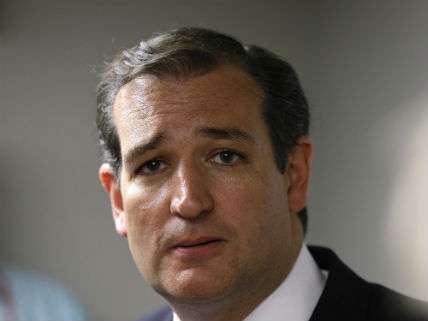Ted Cruz Is Wrong: Climate Change Does Not Necessarily Entail Progressive Policies
"Hot or cold, cooling or freezing, global egalitarian measures are required."

A remarkably interesting NPR interview with Republican presidential hopeful Sen. Ted Cruz (R-Tex.) by Morning Edition host Steve Inskeep explores the candidate's views on climate change. It becomes clear that Cruz chiefly questions the strength of the evidence for man-made climate change because he is worried about the policies that he believes acceptance of climate change implies. Still, the senator is quite correct to point out that climate change is being used to justify the expansion of the size, scope, and power of government. In fact, prominent progressives are not at all shy about forthrightly endorsing this goal.
For example, in her screed This Changes Everything: Capitalism vs. the Climate left-wing activist Naomi Klein proclaims, "Our economic system and our planetary system are now at war." She then gleefully asserts that progressive values and policies are "currently being vindicated, rather than refuted, by the laws of nature."
In the NPR interview, Cruz recalled the brief global cooling scare from the 1970s and noted correctly that some of the same researchers who were worried about that problem later offered the same set of solutions when global warming became the dominant concern.
Indeed, it turns out that Klein is far from being the first left-winger to use climate as an excuse to advocate massive political and economic schemes that aim to reorganize human civilization. A good example of this is the 1976 book The Genesis Strategy: Climate and Global Survival, co-authored by left-leaning climatologist Stephen Schneider. In that book Schneider writes, "I have cited many examples of recent climate variability and repeated the warnings of several well-known climatologists that a cooling effect has set in – perhaps one akin to the Little Ice Age – and that climatic variability, which is the bane of reliable food production, can be expected to increase along with the cooling."
To be fair, Schneider does also note that other researchers are worried about possible future man-made global warming. To handle the problems that would arise from whatever climate change that might happen, Schneider outlines his "Genesis Strategy," which amounts to a vast scheme of international centralized control of energy, population, and food production. Schneider later became one of the leading climatological voices warning about the dangers of man-made global warming for which he advocated more or less the same sort of policies as a solution. "Hot or cold, cooling or freezing, global egalitarian measures are required," quipped University of California, Berkeley political scientist Aaron Wildavsky in his co-authored 1997 book, But Is It True?
Cruz made the same point, "Whatever happens, suddenly these scientists, who are receiving government grants to keep researching this, and these politicians — and, interestingly enough, the solution they are proposing for climate change — massive government control of the economy in every aspect of our lives - is exactly the same solution they proposed for global warming, it's exactly the same solution they proposed for global cooling."
Then Inskeep aptly asked, "Aren't — aren't you the mirror image of that, though? You're working backward from the consequence that you don't want: too much government control, and so you question the science?" Cruz denied that is what he is doing. Nevertheless, it does seem that both Cruz and Klein do oddly share the belief that Progressive policies are necessarily entailed if global warming is happening.
Of course, this is wrong. Scientific facts to do not tell people what specific policies should be adopted to deal with them.
Inskeep and Cruz eventually circle around to the real solution to whatever problems might be posed by future climate change – innovation. "I fully expect in 100 years or maybe 50 years or maybe even 10 or 20 years — I mean, change can be very rapid — that we will move to different energy sources than we are using today," said Cruz. "I also trust that the innovation that will drive that will come from the American free-enterprise system. It will come from innovators putting capital at work."
That's right. As I argue in my book, The End of Doom: Environmental Renewal in the Twenty-first Century:
It is unfortunately the case that government meddling on a global scale has massively distorted energy markets through pervasive subsidies, mandates, and price controls. The result is retarded innovation in the technologies of energy generation. A big first step toward renovating our energy supply systems would be to eliminate those impediments to understanding the real comparative benefits and costs of the production and use of energy. Ultimately, the better and far more effective way to ameliorate and avert future climate change is to mobilize human ingenuity through market processes to drive down the costs of no-carbon energy sources. Despite the constraints on innovation caused by government interference, notable advances in no-carbon energy generation technologies have already been made, ranging from innovative nuclear reactor designs to more efficient and cheaper solar panels. New technologies and wealth produced by human creativity will spark a vast environmental renewal in this century.
Finally, I want to call out Cruz' citing of Ludwig von Mises' insightful analysis of bureaucratic failure.
Go here to read the whole Cruz NPR interview.


Show Comments (238)